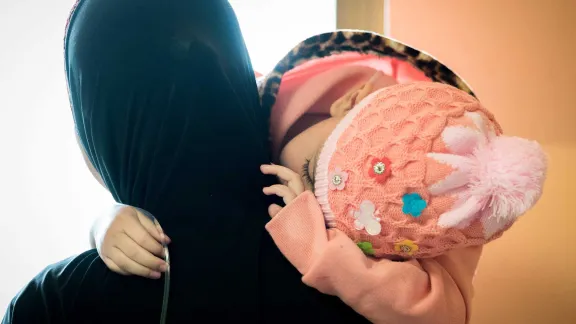Augusta-Victoria-Hospital in East Jerusalem provides live-saving cancer and kidney treatment to Palestinians from the West Bank and Gaza. Currently, 99 patients from Gaza and their companions are being attended to at the hospital, unable to return home. From Jerusalem, they watch helplessly as their families suffer.

Archive image from 2020: A four year old cancer patient from Gaza at AVH, with her mother. The girl was treated for a brain tumor in 2020. Photo: LWF/ A. Hillert
Helplessness as cancer patients watch the situation in Gaza from afar
(LWI) - While the humanitarian disaster unfolds in the Gaza strip, more than 90 cancer patients and their companions are stranded at the Augusta-Victoria-Hospital (AVH) run by the Lutheran World Federation (LWF) on the Mount of Olives in East Jerusalem. AVH has a collaboration with nearby hotels for patients who receive radiation treatment on a daily basis, and cannot commute every day from their homes in the West Bank or Gaza.
The hospital is specialized for cancer and kidney care, the patients here are severely ill. On top of their treatment, they now worry about the families, including children, they left behind in Gaza.
Fatima (name changed) heads the psychosocial unit who takes care of the patients in these difficult times. In this interview, she talks about the situation of the patients from Gaza.
Mourning loved ones
There are currently 99 people from Gaza at the hospital, about half of them cancer patients, and their companions. Fatima's team consists of six social workers, each caring for the patients of one or two departments, providing individual counseling and group sessions.
The team also assists the patients with the logistics of their extended stay at the hospital or in nearby hotels, helping them with clothing, hygiene packs, accommodation and transport to access life-saving treatment like chemotherapy and hemodialysis.
“I feel it is very important to tell them that we are here for them,” Fatima says. “I believe that positive mental health and medical treatment are interconnected. A positive mindset and emotional well-being play an important role in healing and recvery. We divided the patients into groups of ten and provided a safe space to express their feelings and share their fears and worries.” Many patients expressed feelings of guilt, helplessness, anxiety and insecurity. There is a lot of emotions and crying”, she added.
Every patient is mourning loved ones, Fatima added. “Some have not even been able to contact their families.” Patients feel bad, because “they have a roof over their heads, food and electricity, while their families in Gaza suffer. On the phone, children in Gaza tell their parents here in AVH that they are hungry, and thirsty,” Fatima said.
Worry about children
Some patients are children, undergoing treatment accompanied by a parent, often their mother. The parents now do not only worry about the sick child undergoing cancer treatment, but also their other children who are back in Gaza: “Two of the accompanying parents know that their children have been wounded, and they worry that their husbands are not telling them how bad it really is.” The situation makes it difficult for many parents to be fully there with the sick child, and to provide the support the sick child would normally receive.
While the patients at the AVH receive specialized care, the hospitals in Gaza lack the most basic supplies, Fatima hears from her patients. "One patient left his pregnant wife and three-year-old child in Gaza. She gave birth, and soon after broke her leg while running from the bombing. It cannot be treated; the hospitals do not function.”
Mothers express the wish to go back and die with their children.
"Fatima”, Senior Psychosocial Support Officer, Augusta Victoria-Hospital
The situation endangers the success of the cancer treatment. Patients no longer care about their health and want to be with their families in Gaza. “Some think about stopping their treatment, one patient refused to eat.” she said. “Mothers express the wish to go back and die with their children.”
Situation changes every day
The psychosocial support team convenes the support groups every week. “Things change rapidly, these are very difficult times,” explained Fatima. Patients whose families were well last week might receive grave news only days after. The team stays in close contact and makes sure people in distress always have someone to turn to.
For many, their faith is a source of strength, Fatima said. The psychosocial support team are also receiving support to cope with the stress of the job. It is important to provide this kind of support, said Fatima : “In our culture, men do not cry. I tell them, it’s OK. God gave us tears to show that you loved someone, and that you lost them.”
The Augusta Victoria-Hospital asks for donations to feed and house the patients stranded on the Mount of Olives, and to rebuild the early diagnostic center in the Al Ahli Hospital in Gaza.


